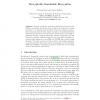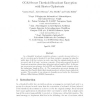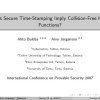PROVSEC
2007
Springer
13 years 10 months ago
2007
Springer
Security of a modern block cipher is commonly measured in terms of its resistance to known attacks. While the provable security approach to block ciphers dates back to the first C...
PROVSEC
2007
Springer
13 years 10 months ago
2007
Springer
We propose a secure threshold signature scheme without trusted dealer. Our construction is based on the recently proposed signature scheme of Waters in EUROCRYPT’05. The new thre...
PROVSEC
2007
Springer
13 years 10 months ago
2007
Springer
In this paper we study security definitions for authenticated key exchange (AKE) protocols. We observe that there are several families of attacks on AKE protocols that lie outsid...
PROVSEC
2007
Springer
13 years 10 months ago
2007
Springer
As such, public-key encryption with keyword search (a.k.a PEKS or searchable encryption) does not allow the recipient to decrypt keywords i.e. encryption is not invertible. This pa...
PROVSEC
2007
Springer
13 years 10 months ago
2007
Springer
In a threshold broadcast encryption scheme, a sender chooses (ad-hoc) a set of n receivers and a threshold t, and then encrypts a message by using the public keys of all the recei...
PROVSEC
2007
Springer
13 years 10 months ago
2007
Springer
PROVSEC
2007
Springer
13 years 10 months ago
2007
Springer
PROVSEC
2007
Springer
13 years 10 months ago
2007
Springer
Game-playing is an approach to write security proofs that are easy to verify. In this approach, security definitions and intractable problems are written as programs called games ...





